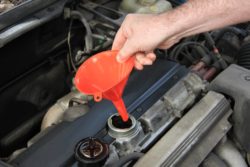Top Class Actions’s website and social media posts use affiliate links. If you make a purchase using such links, we may receive a commission, but it will not result in any additional charges to you. Please review our Affiliate Link Disclosure for more information.
More than one GM class action lawsuit has been filed against the giant automaker over allegations certain vehicles contain defective engines.
Why Have GM Class Action Lawsuits Been Filed?
Between 2010 and 2013, certain GM vehicles were equipped with GMC’s 5.3L V8 Vortec 5300 engine, which included newly designed piston rings intended to maximize horsepower. Unhappy consumers allege the new piston rings allow oil to enter parts of the engine it shouldn’t, resulting in overconsumption of oil.
GM 5.3 engine problems have spurred class action lawsuits because GM allegedly knew about the problems as far back as 2010. According to one class action lawsuit against GM for oil consumption, the company issued a technical service bulletin on Sept. 28, 2010 regarding engine oil consumption of certain 2007 and 2008 model vehicles. GM issued another bulletin on Jan. 3, 2013 regarding the same issue in 2007 through 2011 model vehicles.
That same lawsuit alleges GM issued no fewer than seven service bulletins regarding the overconsumption of oil between the years 2010 and 2013, but because a service bulletin is not identical to a recall, the company was not obligated to notify owners and lessees of the bulletins.
While the affected vehicles were equipped with an oil life monitoring system to alert drivers when an oil change is recommended, the system purportedly did not alert drivers when engine oil levels became dangerously low, potentially destroying engines, claimed the lawsuit.
What Is Causing the GM 5.3 Engine Problems?
The GM 5.3L V8 Vortec 5300 engines make use of an Active Fuel Management (AFM) system that is also called a cylinder deactivation system. This technological advance reportedly can improve fuel economy by 7.5 percent by letting the engine stop using half the engine’s cylinders when the vehicle is operating at lower RPMs with a light load.
According to one explanation on how the AFM system works, even the deactivated pistons continue to move up and down inside the cylinder. Before reaching a speed and load that activates the AFM system, all of the cylinders may be used in the first part of a drive, which means all of the pistons will become warm from use.
When the AFM system kicks in, a specially designed valve sprays oil onto the unused pistons to keep them cool and lubricated. If these pistons are still hot from being used moments earlier, the sprayed oil may virtually bake onto the pistons and the rings. Over time, this baked-on oil interferes with the functioning of the oil rings, which causes oil to seep past the rings. The engine won’t escape damage if the oil rings and cylinders become worn.
Some consumers complain these engines use more than one quart of oil every 3,000 to 5,000 miles. Others say the overconsumption of oil causes valve damage, undue spark plug wear, poor running condition and premature wear on the entire engine.
Specifically, the engines may suffer lifter collapse, camshaft wear, rod breakage, bent pushrods, wristpin wear or breakage, crankshaft wear or main bearing wear, according to class action lawsuits.
One blogger reported some vehicle owners were buying after-market engine tuners to completely disable the AFM system. After plugging the engine tuner into the affected vehicle’s diagnostic port, the consumers said they followed instructions on how to stop the AFM system from deactivating the cylinders. Any misconfiguration in such an after-market product could result in damage to the vehicle, though.
Which Models are Affected?
The GM 5.3 engine problems may affect these vehicles:
- 2011-2014 Chevrolet Avalanche
- 2011-2014 Chevrolet Silverado
- 2011-2014 Chevrolet Suburban
- 2011-2014 Chevrolet Tach
- 2011-2014 GMC Sierra
- 2011-2014 GMC Yukon
- 2011-2014 GMC Yukon XL
Can You Join a GM Class Action Lawsuit for Oil Consumption?
If you own or lease any of the 2011-2014 vehicles listed that were built with a GM 5.3 engine, you could be eligible to participate in a class action lawsuit against GM for oil consumption issues.

A class action lawsuit against GM for oil consumption in Washington state alleges engine oil may be taken out of the valvetrain and deposited into the intake through the action of the engine’s positive crankcase ventilation system (PCV). This could inadvertently lead to more oil being burned than intended.
Which States Have Had a GM Class Action Lawsuit?
A GM class action lawsuit for oil consumption was filed in Minnesota, Oregon, California, Ohio, Washington and Florida, but this investigation is open to every state.
Particularly if you live in Arizona, Colorado, Florida, Louisiana, Maryland, Minnesota or Wisconsin, your case could be of special interest in this lawsuit investigation.
Last fall, GM agreed to a consolidated class action settlement regarding allegations its 2.4L LEA Ecotec four-cylinder engine caused certain vehicles to overconsume oil because of a similar piston ring issue. In that settlement, owners of 2010 to 2013 Chevrolet Equinox and GMC Terrain SUVs will be allowed to have their vehicles inspected and repaired by GM.
Any customer who has already paid out of their own pocket to fix the piston rings issue may qualify for reimbursement from GM for such expenses, explicitly stating the settlement allows for “reimbursement for repairs and/or replacement of engine components that are or were required and solely caused by excessive oil consumption due to piston ring wear.”
Class action settlements are often negotiated when a big company such as GM wishes to avoid the costs, uncertainties and bad press of a trial.
General Motors is run by chairman and CEO Mary Barra since January 2014. GM reportedly employed about 95,000 hourly employees and 69,000 salaried employees as of Dec. 31, 2019. The company reported revenue of $147.05 billion for 2019, which was up one percent from 2018.
Join a Free GM Engine Oil Consumption Class Action Lawsuit Investigation
You may have a legal claim if you purchased a new or used model year 2011-2014 Chevrolet Avalanche, Chevrolet Silverado, Chevrolet Suburban, Chevrolet Tahoe, GMC Sierra, GMC Yukon, or GMC Yukon XL with an LC9 engine.
This article is not legal advice. It is presented
for informational purposes only.
ATTORNEY ADVERTISING
Top Class Actions is a Proud Member of the American Bar Association
LEGAL INFORMATION IS NOT LEGAL ADVICE
Top Class Actions Legal Statement
©2008 – 2024 Top Class Actions® LLC
Various Trademarks held by their respective owners
This website is not intended for viewing or usage by European Union citizens.
















119 thoughts onCan You File a GM Class Action Lawsuit for Oil Consumption?
I have a 2013 Chevrolet Equinox with the same oil issue. I contacted the Chevrolet dealer and was told my mileage was beyond the miles that would qualify for the repair. Is this true. My email is Memphisfinest50@hotmail.com. Please contact me and advise.
We own a 2013 Chevy Silverado that’s is having major oil issues.
My 2013 gmc sierra, burns 1 to 2 quarts in-between oil changes, smoke a little bit also, idles rough.
My 2011 GMC Terrain is consuming at least a quart a week or more
My 2011 terrain is using a lot of oil
They definitely have issues prior to the years listed . 2007 GMC yukon with this exact issue but of course it does not apply for my year :( You let me down GMC.
Been battling the oil consumption myself..how do you going the lawsuit in SC? The dealer always says that irks consumption in within the allowable specs….
My 2018 yahoo with 48000 miles on it and this engine is using oil already what’s my options
I own and purchased new. Have all purchase information and still own. 2013 GMC sierra.using engine oil. I got a call ball letter from GMC and can’t find .
I own a 2023 gmc sierra 5.3l v8 with this problem! Noticed it used oil shortly after I bought it. Only had the truck for about a year before it just died on me in the middle of the highway as i tried to turn onto my road
Could have been bad had there been oncoming traffic at all that night, pushed it out of the middle of the road. I’m from Arkansas though.
I own a 2023 gmc sierra 5.3l v8 with this problem! Noticed it used oil shortly after I bought it. Only had the truck for about a year before it just died on me in the middle of the highway as i tried to turn onto my road
Could have been bad had there been oncoming traffic at all that night, pushed it out of the middle of the road. I’m from Arkansas though.